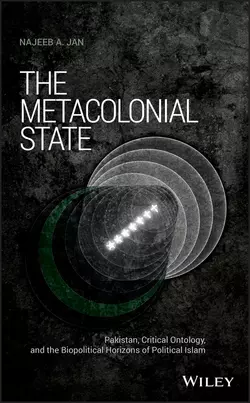The Metacolonial State. Pakistan, Critical Ontology, and the Biopolitical Horizons of Political Islam

Najeeb Jan
Тип: PDF книга
Жанр: Социология
Язык: на английском языке
Издательство: John Wiley & Sons Limited
Дата публикации: 25.04.2024
Отзывы: Пока нет Добавить отзыв
О книге: ′An urgent and extraordinary book. Weaving a philosophical analysis of Heidegger, Agamben and Foucault, Jan draws out the implications of their thought for a radical analysis of the ontological politics of Islam and Pakistan. Whether writing about the ′Ulama and Deoband schools, blasphemy laws, the military, beards, or the Bamiyan Buddhas, Jan provokes and challenges our thinking while unearthing the ground on which Pakistan—and our world—are built.′ —Joel Wainwright, Department of Geography, Ohio State University, USA ′In this exceptionally inventive and important book, Jan shows us that the problems besetting political life in Pakistan are part of a more troubling crisis in modern forms of power. Challenging accounts that cordon off «political Islam» from «the West,» Jan discloses their fundamental indistinction and thus, through his practice of critical ontology, reorients our understanding of how power and violence are at work in the world.′ —Joshua Barkan, Department of Geography, University of Georgia, USA The Metacolonial State presents a novel rethinking of the relationship between Islam and the Political. Key to the text is an original argument regarding the «biopoliticization of Islam» and the imperative need for understanding sovereign power and the state of exception in resolutely ontological terms. Through the formulation of a critical ontology of political violence, The Metacolonial State endeavors to shed new light on the signatures of power undergirding postcolonial life, while situating Pakistan as a paradigmatic site for reflection on the nature of modernity′s precarious present. The cross-disciplinary approach of Dr. Jan′s work is certain to have broad appeal among geographers, historians, anthropologists, postcolonial theorists, and political scientists, among others. At the same time, his explication of critical ontology – with its radical reading of the interlacement of history, power and the event – promises to add a bold new dimension to social science research on Islamism and biopolitics.